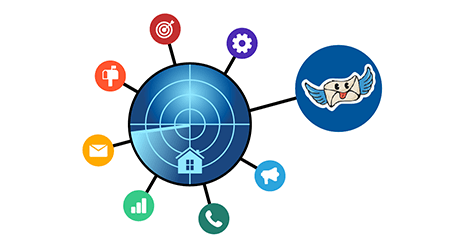How PropertyRadar’s CEO is Revolutionizing Small Business Growth

“Working closely with small business owners, I saw firsthand the same struggles my family had faced — balancing finances, managing highs and lows, and striving to build a better life for their families.”
PropertyRadar CEO Mark Hockridge appeared on my Zoom screen, his eyes reflecting a genuine empathy and compassion for the often-overlooked small businesses.
His words piqued my curiosity.
Bringing Big Tech Capabilities to Small Businesses

“During one of my trips to Sweden, I had a conversation with my dad about his struggles running an automotive repair shop,” Hockridge continued. “He was grappling with finding skilled technicians, managing the flow of business, and dealing with regulatory challenges from the Bureau of Automotive Repair.”
“Listening to him, I was struck by the contrast between his small business hurdles and my own work deploying really big software applications for giant multinational enterprises,” he said.
At the time, Hockridge was leading a multi-national sales team at International Business Systems.
“Then it hit me: What if I could bring that level of technology and capability to small businesses?”
“And I don’t know if it was just the jet lag or the hours on planes, but I started thinking more about it and became convinced that it was possible,” he added. “I think that was the genesis of it.”
Shortly after, Hockridge teamed up with two partners to create a business plan and left his 9-to-5 job in 2000 to pursue it.
Long story short: CustomerLink, a marketing automation platform, was born.
Nurturing a Passion for Small Businesses

Over the next 14 years, Hockridge cultivated a deep understanding of small business needs and challenges, ultimately channeling that expertise and drive into his ventures at CREtelligent and BayIQ.
Then, a chance meeting changed everything.
After selling CustomerLink to Intuit, Hockridge and his family moved to Tahoe for a fresh start, inspired by their son's interest in a ski academy.
During that time, he was figuring out his next steps and met Sean O'Toole, PropertyRadar's founder, through a mutual friend.
Since there weren’t many software businesses in Truckee, CA, their friend thought they’d hit it off from the get-go.
Turns out, Sean’s vision for PropertyRadar was closely aligned with what he’d built at CustomerLink.
What started as casual lunches grew into regular Friday strategy sessions for about a year and a half…“We’d talk about everything from personnel to processes,” Hockridge said.

In 2020, as PropertyRadar was preparing to expand nationally from five Western states, Hockridge came on board to work on processes and explore inside sales as a go-to-market strategy.
After six months, Hockridge and OToole realized the company wasn’t ready for that just yet, so Hockridge stepped back and co-founded another PropTech startup in commercial real estate.
Then, about a year and a half ago, OToole reached out again, wanting to brainstorm over some key contracts.
During those discussions, he mentioned wanting to focus more on the product side of the business, where his passion lies, and that he wanted someone else to focus on people, processes, and growth goals.
That night, he called and said, 'I want that person to be you.' So they worked out a deal, and Hockridge officially rejoined.
“What drew me in was Sean’s vision of helping small businesses not just identify opportunities through data but also make meaningful connections,” Hockridge said. “That mission aligned with a common thread throughout my career.”
Leading the Evolution of PropertyRadar

When Hockridge first joined PropertyRadar, the platform was mainly focused on helping real estate investors, realtors, mortgage professionals, and home service pros gather detailed information about properties, conduct research, and build audiences.
This included looking up data on property values, ownership histories, and market trends.
These user types not only used this information to identify high-quality leads and opportunities but also made smarter decisions about buying or selling properties in the process.
Since then, the platform has evolved into a small business growth engine.
Meaning, it helps small businesses, realtors, investors, and others find and connect with their best opportunities through targeted outbound lead generation, optimize their marketing strategies, and make data-driven decisions, all while using powerful automation capabilities for streamlined and efficient outreach.
“We’re here to help the underdogs, and that’s something we’re committed to every day, Hockridge said."
And that small business mindset is always top of mind for him.
“We’re still working on fully building that small-business-first culture within our company,” he said.
“We talk about it a lot, and we try to educate the team on the importance of supporting small businesses — not just through our software but in our day-to-day buying and consumption behaviors,” he added.
Bringing Hyperlocal Lead Generation to Small Businesses

One area Hockridge decided to focus on is how small businesses acquire customers.
Small businesses often find hyperlocal lead generation and marketing tough because they face a lot of uncertainty.
Hyperlocal lead generation targets potential clients within a specific geographic area, focusing not only on location but also on the specific needs and attributes of the target audience.
Unlike broader marketing approaches, hyperlocal lead generation targets a small, defined area — like a neighborhood or city block.
By using detailed local data, like property records, businesses can tailor their marketing efforts to address the unique needs and interests of people in that particular area.
However, small businesses might not know which strategies will work best, how customers will react, or which methods will bring in the most leads.
With limited resources and a lack of experience, business owners face increased risk in every decision, from selecting marketing channels to investing in new tools. The overwhelming number of pitches only adds to the uncertainty about where to find efficient and effective lead generation.
This makes it difficult to commit to one approach, as small business owners must carefully weigh the potential benefits against the risk of wasting resources.

So what’s the solution? Enter PropertyRadar into the chat.
We simplify your search by bringing together key public records data from 150 million properties, 250 million people, and over 1 billion phone numbers and emails, all within a user-friendly platform available on both desktop and mobile apps.
“Our mission is to help them connect with their best opportunities with more confidence by focusing on what they do well in their local area and standing out as local specialists,” Hockridge said.
With PropertyRadar at your disposal, you can bypass the middleman and connect directly with the property owner.
“We're creating a new category,” Hockridge added. “While there are plenty of tech firms focused on managing customer relationships, our emphasis is on helping small businesses generate leads.”
Ultimately, the goal is to make lead generation easier and more effective for small local businesses.
PropertyRadar works closely with small businesses through trade associations, mastermind groups, and one-on-one consultations to understand their specific needs and goals.
“As PropertyRadar continues to evolve, we know we’re entering uncharted territory,” Hockridge said. “I think it's mostly about us creating a category that hasn't been a focus of other companies.”
“Small businesses have limited budgets and countless options for spending them, so we focus on showing them how investing in hyperlocal lead generation can lead to real growth,” he added.
Overcoming the Biggest Problems Small Businesses Face

When it comes to small businesses, the challenges they face haven’t really changed much over the years.
Whether it’s a plumber, a software developer, or any other skilled professional, they often start their businesses because they're good at something, but they quickly realize they have to juggle multiple roles — finance, HR, marketing — without the skills or resources to handle them all.
It’s tough because they're working with limited budgets and can't just hire a full team.
As a result, they get stretched thin, and the very skill that drove them to start the business ends up taking a back seat.
For small businesses to succeed, especially when resources are limited, owners need to wear many hats or find others who can assist (AKA PropertyRadar).
“Growth can be daunting, particularly when it requires stepping outside your core competencies,” Hockridge said.
Right now, the field is already tilted in favor of big businesses, whether through legislation, taxes, or resources.
“Everything tends to favor large corporations, and I think that will continue,” Hockridge said. “There’s a lot of lobbying power behind it, and big businesses look out for their own interests.”
Sometimes small businesses benefit from this, but often they don’t, he said. So, I think small businesses will continue to struggle to stay competitive in that kind of landscape.
So, what can small businesses do to stay ahead of the game? Focus on targeted outbound marketing in the channels where your best opportunities are found.
Forging Ahead with Multi-Channel Marketing

Hockridge’s near-term goal for PropertyRadar is to further expand the ability to find and connect with the best-fit opportunities for our clients.
But what does this really mean? It boils down to making it easier to locate and connect with potential leads through multiple channels.
I think the existing categories are phone, SMS, direct mail, door knocking, email. I think we should not disclose the online ads in this article. Too much risk of having someone beat us to it
We’ve already started with phone, direct mail, door knocking, and email.
But that’s just the beginning — there’s more in the pipeline (stay tuned).

“For us as a company, it’s not just about growing revenue but increasing our impact,” he added. “The more success we find, the more we can reinvest in technologies that help small businesses in new ways.”
This is what’s called the flywheel effect, where everything you do to improve your business feeds into itself, creating a powerful cycle of growth.
Essentially, the more you invest in understanding your business and refining your strategies — like choosing the right channels and perfecting your messaging — the smoother and more efficiently everything runs.
Building the right team to drive this mission forward is crucial, Hockridge said.
“We’ve built a rigorous hiring process focused on values and culture to ensure the right fit, especially as we grow quickly,” he added. “Every new hire impacts the culture, so we’re intentional about maintaining that focus.”
Coming Full Circle

If you’ve met Mark Hockridge or you’ve learned about him through this article, you know that his love for small businesses is undeniable.
He’s dedicated over 24 years to championing small businesses over large corporations.
Cue Oscar level of applause.
“The joy comes from knowing we’ve helped tens of thousands of small businesses, and the potential to grow that impact excites me every day,” Hockridge said.
Get a free PropertyRadar trial and unlock the power of 150 million properties to find your next leads today.



